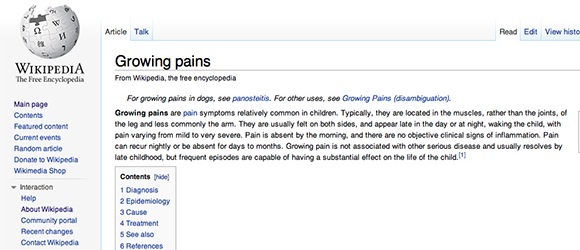Study Finds That Wikipedia Is Having a Really, Really Hard Time Keeping Its Editors
the internet is serious business

Wikipedia has hit a roadblock, and it’s one unrelated to those once-ubiquitous “personal appeals” for funding by founder Jimmy Wales (you know what I’m talking about). This new problem is that Wikipedia, a site that relies on the public to create their content, is having trouble holding onto people who want to contribute to it.
According to a study published in the American Behavioral Science Journal, the number of Wikipedia’s English-language editors dropped 30% between 2006 and 2011, from 50,000 to 35,000. One of the major reasons for that is stricter standards for editors, meant to cut down on misinformation, that were introduced in 2007. That they would lead to a drop in contributors was expected. But, says lead researcher Aaron Halfaker, “What was most surprising was the scale of the problem.”
Says The Daily Dot:
“In 2006, only about 6 percent of ‘quality’ new editors had their contributions rejected—a.k.a. ‘reverted’ in Wikipedia lingo. In 2010, the number of contributions by new editors were being reverted at a rate of 1-in-4 by senior editors and the site’s own automated response systems.
Halfaker said that as a result, only about 11 percent of new editors have been staying on past their first two months, driving down the total number of contributors to the site. He said part of that has to do with the ‘nasty’ initial experience many new editors have.”
Another problem is a sort of unofficial hierarchy of editors, which often favors the edits made by veterans over newbies, making said newbies less inclined to stick around.
“From what I can extrapolate from our models,” Hafalker says, “Wikipedia isn’t going to run short on contributors for at least five years. The Wikimedia Foundation has a team working on the problem, so hopefully we’ll never get to that point.” Among the initiatives already in place to keep new editors from getting frustrated and quitting are the Wikipedia Teahouse, “a many-to-many support space designed specifically for new editors.”
Hafalker admits that, as Wikipedia is the first of its kind, it’s unknown how (or if) having a smaller number of editors affects the quality of information found on the site.
Normally I’d say that this wasn’t a big deal—the site’s been around for 11 years, an eternity in Internet time, and contributions were bound to drop off. But losing 15,000 editors in five years? That seems major. At least Wikipedia is aware of the problem and is taking action to turn things around. I’d hate to think that such a wonderful resource for time-wastage and research (but always be sure to fact-check what you find on Wikipedia, kids!) was in danger.
(via: The Daily Dot)
Are you following The Mary Sue on Twitter, Facebook, Tumblr, Pinterest, & Google +?
Have a tip we should know? [email protected]